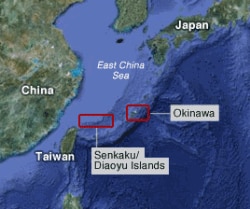TOKYO —
The United States and Japan have agreed to place a new missile defense radar system on Japanese territory to defend against a ballistic missile threat from North Korea.
U.S. Defense Secretary Leon Panetta and Japanese counterpart Satoshi Morimoto announced the deal Monday after a meeting in Tokyo.
Panetta said the X-band radar is meant to protect Japan as well as the U.S. homeland. He stressed the system is not directed at China.
Morimoto said no location has been picked for the radar site.
The United States has existing early warning radar systems on ships deployed in the region. Those ships will now have more freedom to move around the area.
Panetta also said before flying to China Monday that the U.S. is concerned about the dispute over islands in the East China Sea. "It's in everybody's interest - it is in everybody's interest - for Japan and China to maintain good relations and to find a way to avoid further escalation," he stated.
Both China and Japan claim the uninhabited, resource-rich island chain known as Diaoyu in China and Senkaku in Japan.
Panetta said the U.S. does not take a side in the issue but will stand by its treaty obligations.
He will urge China to engage in dialogue with members of the Association of Southeast Asian Nations in order to create a format for resolving such disputes.
Anti-Japan protests, some of which have turned violent, continued in China for a third day Monday.
The United States and its allies in the region have expressed growing concern about North Korea's missile tests and nuclear arms programs. Despite warnings by the international community, Pyongyang fired a rocket in April, saying it was meant to launch an experimental satellite. But it is generally believed the launch was a missile test.
U.S. Defense Secretary Leon Panetta and Japanese counterpart Satoshi Morimoto announced the deal Monday after a meeting in Tokyo.
Panetta said the X-band radar is meant to protect Japan as well as the U.S. homeland. He stressed the system is not directed at China.
Morimoto said no location has been picked for the radar site.
The United States has existing early warning radar systems on ships deployed in the region. Those ships will now have more freedom to move around the area.
Panetta also said before flying to China Monday that the U.S. is concerned about the dispute over islands in the East China Sea. "It's in everybody's interest - it is in everybody's interest - for Japan and China to maintain good relations and to find a way to avoid further escalation," he stated.
Both China and Japan claim the uninhabited, resource-rich island chain known as Diaoyu in China and Senkaku in Japan.
Panetta said the U.S. does not take a side in the issue but will stand by its treaty obligations.
He will urge China to engage in dialogue with members of the Association of Southeast Asian Nations in order to create a format for resolving such disputes.
Anti-Japan protests, some of which have turned violent, continued in China for a third day Monday.
The United States and its allies in the region have expressed growing concern about North Korea's missile tests and nuclear arms programs. Despite warnings by the international community, Pyongyang fired a rocket in April, saying it was meant to launch an experimental satellite. But it is generally believed the launch was a missile test.





